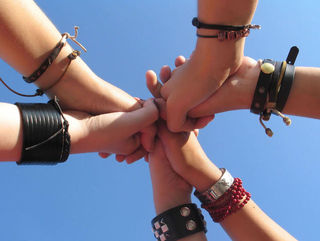Bias
What's Wrong With Locker Room Talk?
Boys will be boys. What's the problem with that?
Posted October 10, 2016 Reviewed by Davia Sills
“I moved on her like a b****, but I couldn’t get there. And she was married."
“I did try and f*** her.”
“You know, I’m automatically attracted to beautiful—I just start kissing them. It’s like a magnet. Just kiss. I don’t even wait. And when you’re a star, they let you do it. You can do anything. Grab them by the p****. You can do anything.”
In the audio of the now-infamous conversation between Donald Trump and Billy Bush, now an anchor on NBC’s TODAY Show, Bush can be heard laughing, participating approvingly in the graphically lewd conversation, and making validating comments such as, “Sheesh, your girl’s hot as sh**... Yes! Yes, the Donald has scored!” (referring to Arianne Zucker, the Days of Our Lives actress Trump and Bush were about to meet).
As a result of the comments and behavior revealed in the recording, Noah Oppenheim, the NBC executive in charge of the TODAY Show, sent a memo to his staff that read in part that he was “deeply troubled” by the revelations.
“Let me be clear: There is simply no excuse for Billy's language and behavior on that tape,” Oppenheim wrote. “NBC has decided to suspend Billy pending further review of this matter."
According to USA Today, Bush has said he is “embarrassed and ashamed” about his role in that conversation. “It’s no excuse, but this happened 11 years ago—I was younger, less mature, and acted foolishly in playing along. I’m very sorry.”

Was there really anything wrong with men speaking this way about women in private? From a psychological perspective, the answer is unambiguous.
There is a problem with it, and it isn't about being politically correct. It is important to understand the damage this kind of talk does not only to women but also to the men who speak this way, and the men who hear it.
The defense that it was just "locker room banter," as Trump has explained, and the additional argument that it was “just talk” illustrates a basic misunderstanding about the power of words. Words are among the basic building blocks that create our reality. A person sees life through a lens that is in part created by the words that describe what he or she sees. Words help us see things we would otherwise not see.
Marketing professionals have understood this for years. In Japan, prunes are considered a miracle fruit, so they are highly sought-after food. In the U.S., however, although prunes have various properties beneficial to one’s health, they are psychologically associated with laxatives and the elderly. In order to be more attractive to younger consumers, plum growers started packaging prunes as “dried plums” (which they are), and sales increased. (Interestingly, older people prefer prunes to dried plums.)
We are all wired to make neural connections in order to use our brains more efficiently. As a result, the psychological associations that words create are powerful and hard to undo. The ways in which we speak “prime” us to think in certain ways, and we don’t even notice it.

In one study, when Asian women were asked questions that prompted them to think about their ethnicity before taking a math test, they performed better than when in a neutral condition. When they were asked questions that prompted them to think of their gender, their performance was worse. These implicit biases are created by the ways in which we speak about people.
When men speak about women using “locker room talk,” men are priming themselves to think of women as sex objects they can “grab” and to whom they can “do anything.” Even if men don’t consciously think they have less respect for women as a result of engaging in or hearing these kinds of conversations, below the level of awareness, their brains are making associations.
Plenty of men see the problem with speaking about women this way, but when faced with “locker room talk,” many “play along” the way Billy Bush did in 2005. Of those who don't, many remain silent. Why don’t they speak up?
Christopher Freiman, assistant professor of philosophy at the College of William and Mary in Williamsburg, VA, suggests that in these kinds of situations, we are thwarted by our need to belong. “We don’t want to appear arrogant, untoward, or rude… So we swallow our objections” instead of speaking up. Our desire to be accepted overwhelms our commitment to moral decency. We “go along to get along,” he says, “in defiance of what we really value or believe because we don’t want any trouble.”
This basic human tendency is apparent in situations as extreme as Nazi Germany and as banal as choosing not to challenge a person purveying gossip. “Doing the wrong thing,” Freiman asserts, “is, for most of us, pretty mundane. It’s not usurping political power or stealing millions of dollars. It’s nervously joining in the chorus of laughs for your co-worker’s bigoted joke or lying about your politics to appease your family at Thanksgiving dinner.”
According to psychologists Roy Baumeister and Mark Leary, the need to belong is “a powerful, fundamental, and extremely pervasive motivation.” In fact, Baumeister and Leary contend that much of human behavior and even many of our thoughts and emotions are caused by the fundamental need to belong.
There appears to be a neurological basis for this. Stanford neuroscientist David Eagleman’s studies indicate that our brains are wired to be more empathetic to those in our “in-group” than to those in the “out-group.” Through fMRI research, he found that we register more empathetic pain when pain is inflicted on people we identify as being like us, even if we don’t consciously think we feel differently about them.
We are awash in implicit bias—the tendency to unconsciously register things differently depending on someone’s in-group or out-group status—and we are, for the most part, completely unaware of these effects. We are often able to notice implicit bias in others, but it is extremely difficult to see it in ourselves.
Unconscious biases cause us to come to the wrong conclusions about why we have certain thoughts and emotions, and why we make certain decisions. We can point to very rational and logical reasons for our opinions, beliefs, and actions, but we are often at the mercy of unconscious processes that lead us to our conclusions. Furthermore, our conclusions appear to us to have been formed by process of conscious reasoning, but in actuality, they were there before our brains handed us both our conclusions and what we believe are the reasons for them.

This unconscious process even affects how we view children as young as preschool age. Recent research out of the Yale Child Study Center provides evidence that implicit racial bias is implicated in black children being suspended from preschool more often than white children. This implicit bias was revealed by examining where teachers looked when instructed to expect challenging behaviors in a video of preschoolers.
Although the preschool teachers did not consciously think they expected black preschool boys to exhibit more challenging behavior, they “gazed longer at black children, especially black boys,” when looking for challenging behavior, regardless of the teachers’ own race. (The children in the video did not, in fact, demonstrate challenging behaviors.) In other words, if we’re looking for something, we are more likely to see it, and if we unconsciously expect to see it in a certain place, that is where we will look.
Returning to the importance of words; the words we choose betray, maintain, and convey our hidden biases. A study in the journal Mindfulness uncovered what researchers described as “linguistic intergroup bias” (LIB). We unconsciously expect people in our in-group to behave positively, and those in the out-group to behave negatively, so when viewing an image of someone hitting someone else, respondents chose factual words (like “hitting”) when someone in their in-group did the hitting, and used interpretive words (like “aggressive”) when describing the action of someone in the out-group.
When viewing an image of someone pulling a hurt person off the ground, subjects used interpretive words (like “helping”) when describing someone in their in-group, and factual words (like “picking up”) when describing the actions of someone in the out-group. The words we use don't merely describe; they create and maintain the ways in which we see the world, including how we view others.
There appears to be a silver lining, though, regarding our neurological tendency to react with more empathy to those in our in-group. David Eagleman conducted a follow-up study in which he placed people in one of two groups by a flip of the coin. Participants knew their group identification was due to a coin-toss, and yet fMRI imaging demonstrated that their brains still reacted with more empathy to the pain inflicted on members of their arbitrary in-group than members of the arbitrary out-group. In other words, our brains are able to quickly create a sense of in-group belonging.

If we can find the key to creating in-group identification, we can make our brains our allies in having empathy for others with whom we don’t currently identify as an "us," whether the difference we perceive is about gender, race, political ideology, or anything else.
Buddhists believe they have at least one such key. “Compassion meditation” is a practice that expands our circle of care and loving kindness from those whom we love to those whom we dislike and even those we regard as enemies.
Compassion meditation is a particular type of mindfulness practice, but in the LIB study above, even briefly practicing a kind of mindfulness that encouraged participants to take an “observing perspective”—in other words to be “aware that they were simply observing their thoughts and reactions to the events in the present moment instead of living them”—had the effect of loosening the in-group bias.
Being aware that we are at the mercy of our brains’ in-group bias and desire for social approval is an essential first step in overcoming it. We teach children to role-play difficult social scenarios so they will have developed neural patterns that activate in situations like those they have rehearsed.
Taking the philosopher's perspective, Freiman told me that Cato, the ancient Stoic, allegedly wore unusual clothes (among other things) in order to desensitize himself to social disapproval so he would not be pulled in the wrong direction and could stand up for what was right.
“In brief,” Freiman said, “if your goal is to enable yourself to endure the discomfort of opposing the crowd, the best strategy is practice.”
Several professional athletes appear to be doing just that. Taking issue with Trump's "locker room talk" defense, they have publicly denounced speaking about women that way. Chris Conley of the Kansas City Chiefs has a suggestion: "If that's the talk you hear around you, then be the place where change begins," he tweeted. "Regardless of this election, let's be a better people."
* To be clear, I am an advocate of free speech. I am in no way suggesting that this vulgar speech should be made illegal.




